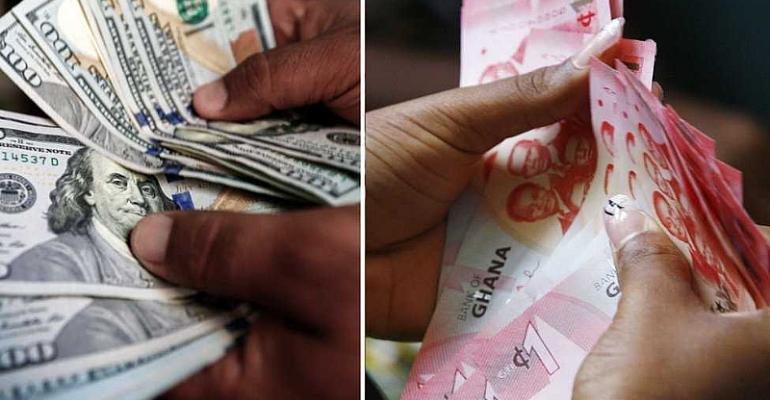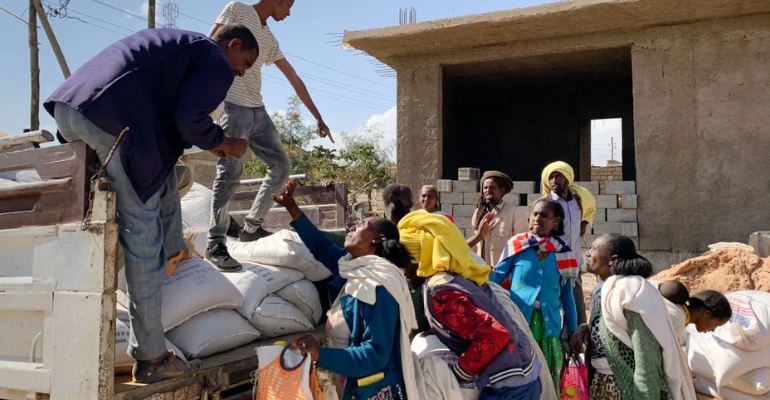In October 2025, speaking of dollarization in Ghana, Bank of Ghana Governor Dr. Johnson Asiamah explained that “It’s one of the things I would want to be remembered for, that I came, I solved that problem.” It was a trenchant assertion for a problem as old as the cedi itself. From estate agents demanding rent in dollars to private schools listing fees in USD, Ghana’s economy has grown used to pricing big-ticket transactions in USD. For years, dollarization has eroded the central bank’s ability to bolster the economy.
Dollarization is an inconvenience, but it is also a symptom of weakened monetary credibility. When a Ghanaian car dealer or landlord quotes in dollars, it is both a defiance and a hedge. It signals that the cedi’s future purchasing power is uncertain to Ghanaian buyers and sellers. That simple behavioral shift undermines everything from inflation targeting to credit deepening.
BoG has tried to clamp down before. The Foreign Exchange Act of 2006 (Act 723) explicitly bans pricing, advertising, or receipt in foreign currency for domestic transactions. Periodically, the central bank reminds the public that offenders can face fines or imprisonment. Yet, in reality, the practice persists. It is quietly tolerated, occasionally punished, and always rationalized by economic actors seeking stability in a volatile environment.
Why Dollarization Hurts
The first casualty of dollarization is monetary sovereignty. If domestic goods and services are priced in USD, changes in the BoG’s policy rate lose their punch. The central bank may raise rates to curb inflation, but if half the economy uses another currency, those signals fade into noise. Inflation targeting depends on operational anchors and transmission: the ability of policy rates to influence spending, borrowing, and pricing. Dollarization jeopardizes that mechanism.
The second casualty is balance-sheet stability. Ghanaian firms with cedi revenues but USD liabilities suffer massive mismatches when the exchange rate falls. A 10% depreciation can wipe out profit margins overnight, forcing potential layoffs or defaults. For banks, that means rising non-performing loans and a greater temptation to dollar-lend only to exporters, which further narrows credit access for the domestic economy.
The third casualty is trust. Currencies work because citizens believe tomorrow’s cedi will be worth roughly what it’s worth today. When everyone scrambles for dollars, that belief collapses into self-fulfilling prophecy.
Why Bans Alone Don’t Work
BoG’s latest crackdown, reminding the public that “pricing, advertising or receiving payments in foreign currency for domestic transactions is illegal,” is well-intentioned. But as financial analyst Joe Jackson warned, a ban on dollarization could backfire without cedi stability. Prohibition without credibility only drives the practice underground.
History is full of such examples. Latin America’s dedollarization efforts in the 1990s succeeded only after years of low inflation, credible fiscal anchors, and transparent monetary policy. Zimbabwe’s attempts to outlaw foreign currency use collapsed within months because confidence was non-existent. From these examples, we learn that the sequence matters: macro credibility first, micro enforcement second. Dollarization is less a legal violation than a market verdict, a referendum on confidence in the cedi.
When Policy Fuels Instability
Critics also point out that Ghana’s dollarization problem is not just a private-sector reaction but a cumulative outcome of government behavior. For years, fiscal excesses, quasi-fiscal operations, and politically timed exchange-rate interventions have collectively undermined the cedi’s credibility.
The pattern is familiar. Ahead of elections, the state frequently increases spending through arrears clearance, subsidies, or public-sector wage hikes. Those surges widen the fiscal deficit, forcing the Bank of Ghana to absorb excess liquidity or directly finance shortfalls. The result is a predictable cycle: fiscal slippage → monetary accommodation → inflationary pressure → currency depreciation. Each round of depreciation reinforces the perception that the cedi is structurally weak and transient.
Artificial interventions further entrench this instability. In attempts to “defend” the currency, the BoG has periodically injected foreign exchange reserves or imposed temporary import restrictions. While these actions buy time, they also distort market signals. Traders and investors quickly learn that the cedi’s stability is managed and not earned.
The deeper problem is institutional, not technical. Exchange-rate instability is the visible symptom of a governance deficit: the absence of credible, rule-based coordination between fiscal and monetary authorities. As long as ministries treat the central bank as a financing backstop, and as long as the BoG faces political pressure to smooth volatility artificially, market actors will rationally continue to price in dollars.
Structural Reforms for Durable Stability
Escaping the dollarization trap therefore requires reforms that force discipline into policy, not merely exhortations to “believe in the cedi.” We suggest three possible options:
- Legally Enforce Fiscal-Monetary Coordination.
Amend the Public Financial Management Act to cap BoG financing of deficits at a fixed share of previous-year revenues (e.g., 5%). Require quarterly joint statements from the Ministry of Finance and BoG detailing compliance with this rule: transparency creates credibility. - Adopt a Transparent, Rules-Based FX Intervention Framework.
BoG interventions should follow a published rule, such as defending a real effective exchange-rate band or targeting reserve adequacy thresholds, rather than discretionary timing. Publishing intervention data with a lag (as Chile does) can anchor expectations without inviting speculation. ACEYE has consistently argued that such disclosure not only strengthens accountability but also disciplines both fiscal and monetary authorities by making the true cost of defending the cedi visible to the public. - Institutionalize Counter-Cyclical Fiscal Tools.
Create a formal stabilization fund for commodity revenues (especially gold and cocoa) to smooth exchange-rate pressures. When prices boom, excess proceeds are saved; when they fall, reserves cushion the shock. Such a framework delinks the currency from electoral and commodity cycles.
In short, dollarization feeds off of policy inconsistency. Ending it will demand that the government itself stops behaving like a short-term currency speculator. When fiscal and monetary anchors are mutually credible, citizens will start treating the cedi as more than a temporary store of value.
The Anatomy of Dedollarization
So what would a credible anti-dollarization strategy for Ghana look like? It requires a synchronized policy framework combining macro, prudential, and behavioral tools:
- Make the Cedi Worth Holding
The foundation of any dedollarization effort is a currency people want to keep. That means the cedi must deliver stable purchasing power, predictable yields, and a perception of institutional discipline.
- Keep real interest rates positive. If inflation runs at 10% and policy rates sit at 15%, the real yield is +5%. But if inflation expectations exceed nominal rates, savers flee to USD. BoG must ensure that its nominal policy rate systematically exceeds expected inflation, whilst communicating that commitment clearly.
- Anchor fiscal policy. No central bank can sustain confidence if fiscal authorities spend recklessly. Ghana’s fiscal slippages in 2022–23 forced BoG to monetize deficits, feeding inflation and weakening the cedi. Between 2022 and mid-2023, the BoG provided over GH¢44 billion (≈7% of GDP) in direct financing to the government, a move the IMF later described as “extraordinary monetary financing inconsistent with the Bank of Ghana Act.” A credible fiscal rule (e.g., tying expenditure growth to non-oil revenue) would insulate the cedi from political cycles.
- Build credible reserves. BoG’s experiment with gold-backed reserves is a step in the right direction. It diversifies the asset base and signals prudence. But the goal isn’t gold fetishism but to ensure the central bank can meet market FX demand without panic rationing.
- Fix Enforcement Where It Matters Most
Enforcement should be surgical and not theatrical. Blanket bans often punish small traders while big firms quietly continue pricing in USD.
- BoG should instead prioritize high-impact sectors, such as real estate, automobiles, private education, and luxury retail, where dollarization is most visible and contagious. Act 723 already empowers the central bank to impose fines and revoke licenses. It simply needs to wield that authority consistently.
- BoG should also clarify legal carve-outs. Transactions involving non-residents, cross-border services, or contracts settled through authorized forex dealers can justifiably be in foreign currency. But every other domestic transaction, especially between Ghanaian residents, must settle in cedi. Clear, public circulars reduce the “grey zone” that allows selective enforcement.
- Give Businesses Inflation-Proof Cedi Options
Most firms dollarize from fear – The fear that inflation will erode multi-year contracts. The antidote, therefore, is to create inflation-indexed cedi instruments as hedges to manage expectations.
For instance, BoG and the Ministry of Finance can publish standard CPI-linked contract templates for landlords, schools, and service providers. A landlord could, for instance, set rent in cedi terms adjustable every six months to the CPI. That way, both parties retain predictability without resorting to USD.
Similarly, firms can be encouraged to adopt BoG reference-rate clauses, allowing annual adjustments tied to the central bank’s base rate. These mechanisms already exist in Peru and Israel’s dedollarization playbooks and they worked precisely because they aligned private contracts with the domestic policy anchor.
- De-risk Cedi Use Through Market Instruments
Dedollarization succeeds when risk management replaces risk avoidance. If businesses can hedge exchange-rate exposure, they stop demanding USD upfront.
BoG can expand its nascent FX forward auction program, offering 30, 60, and 90-day forwards at transparent spreads. Even a shallow market helps firms plan in cedi without fearing sudden losses.
Banks should be encouraged (through prudential regulation) to price USD loans realistically. That means higher capital risk weights and reserve requirements for USD loans to unhedged borrowers to convey a simple message: if your revenue is in cedi, borrow in cedi. Let foreign-currency credit be reserved for exporters and genuine trade finance.
- Reward Cedi Payments
Last but not least, behavioral nudges matter. The easier and cheaper it is to transact in cedi, the faster habits change.
BoG can instruct payment providers to cap merchant fees on cedi-denominated cards and GhQR payments, while allowing higher fees for USD settlements. Over time, that price differential will tilt behavior.
Likewise, mandatory cedi-first pricing should become the norm. Advertisements, websites, and invoices must display cedi as the only payable currency. If a reference USD value is shown, it should automatically refresh to the BoG’s daily mid-rate—and all settlements must still occur in cedi.
And finally, government itself must lead: every public tender, lease, and service fee denominated strictly in cedi. Nothing undermines monetary credibility faster than a government that prices its own rents in dollars.
The Sequence: Credibility, Then Enforcement
Every dedollarization success–Peru, Israel, Poland, even Mongolia–follows the same sequence:
- Disinflate first and anchor expectations.
- Develop local-currency instruments (bonds, deposits, forwards).
- Apply prudential and legal measures to reinforce behavior.
Ghana cannot reverse that order. Declaring “the cedi is the currency of choice” before the fundamentals support it risks public fatigue and enforcement hypocrisy. Yet, for the first time in years, the macro pieces are aligning: inflation has slowed from 54% in early 2023 to under 10% by mid-2025; fiscal consolidation is underway under the IMF program; and reserves are rebuilding.
The Free-Market Case for Dedollarization
A libertarian perspective might instinctively recoil from currency bans. After all, free markets should allow voluntary contracts in any medium of exchange. But markets only function when prices convey reliable signals, and that requires a stable, trusted numeraire. Dollarization distorts that signal, creating two parallel economies and a blurred inflation thermometer.
A market-friendly approach to dedollarization is therefore not about coercion but about restoring price integrity. The government’s job is to enforce property rights, not to dictate currency choice—but it must ensure that the national currency is credible enough for citizens to choose it freely.
In this sense, dedollarization is less about nationalism and more about competition: making the cedi outperform the dollar on convenience, trust, and cost.











